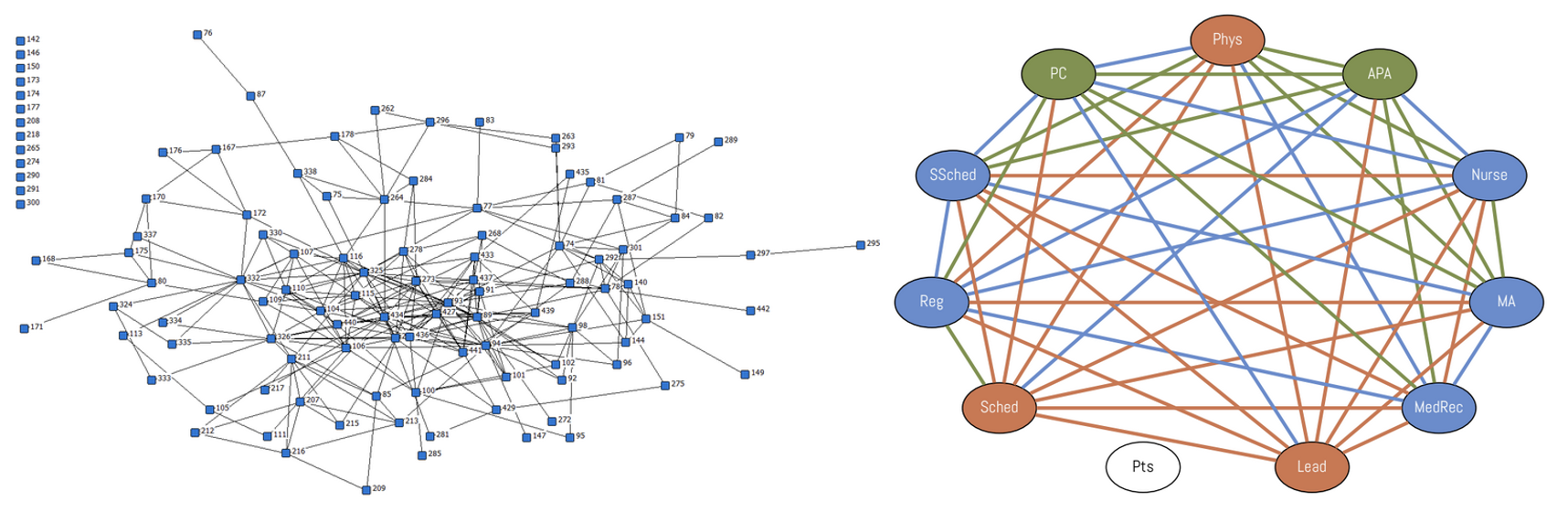
December 2024 RC Cafe - Integrating Relational Coordination and Social Networks

Learn how others are combining these two analytic approaches and how they can be combined in your own work.
Where: Virtual (Zoom provided to registrants)
Facilitator and Discussant
- Sijia Wei, Northwestern University
Panelists
- Stephen Shortell, UC Berkeley School of Public Health
- Jill Marsteller, Johns Hopkins University School of Public Health
- Jody Hoffer Gittell, The Heller School, Brandeis University; RC Analytics
- Heba Naim Ali, The Heller School, Brandeis University; RC Analytics
- Al-Karim Samnani, University of Windsor
Background
We live in a highly interdependent world - socially, emotionally, economically, physically, environmentally, biologically and evolutionarily. “As human beings, we exist as members of collectives and we survive only if we are accepted and recognized by others, starting at birth. We are thus interdependent, both socially and physically, at the most basic level of survival” (Gittell, 2016). As a result of this interdependence, humans need relationships to achieve their desired outcomes. However relationships are at risk around the world due to the rise of remote work, technologically mediated communication, economic inequality and political polarization.
In this Cafe, we explore relational analytics as valuable tools to analyze relationships, their predictors and their outcomes with the goal of understanding how to leverage them more effectively in our research and practice. Despite serving as primary lenses through which relational analytics are explored, the fields of relational coordination and social networks rarely intersect (Soltis, Methot, Gittell & Harris, 2023). The combination of relational coordination (Gittell, 2002; Gittell, Seidner, & Wimbush, 2010) and social networks (Borgatti, Mehra, Brass, & Labianca, 2009; Borgatti, 2006; Brass, 1981) has the potential to better describe, assess, and improve the coordination of work in multi-level organizational systems. Social network analysis provides tools for seeing the structure of relationships while relational coordination provides tools for seeing the content, quality and strength of those relationships along actionable dimensions. Together the two methods may help participants to see the whole together more clearly and design better solutions.
Several innovators have begun this integration, in particular Nidhi Khosla, Jill Marsteller and colleagues (2016), followed by Jody Hoffer Gittell and Heba Naim Ali (2021), then Rob Burns, Ingrid Nembhard and Steve Shortell (2022) and most recently, Scott Soltis and Al-Karim Samnani (2024).
This Cafe
The December RC Cafe brings these innovators together to reflect and build upon on their efforts thus far to integrate relational coordination and social networks. Facilitated by Sijia Wei with her recent methodological innovations, we hope to further innovate an approach to relational analytics that simultaneously employs the theories and methods related to relational coordination and social networks.
References
Borgatti, S. P., Mehra, A., Brass, D. J., & Labianca, G. (2009). Network analysis in the social sciences. Science, 323(5916), 892-895.
Borgatti, S. P. (2006). Identifying sets of key players in a social network. Computational & Mathematical Organization Theory, 12, 21-34.
Brass, D. J. (1981). Structural relationships, job characteristics, and worker satisfaction and performance. Administrative Science Quarterly, 331-348.
Burns, L. R., Nembhard, I. M., & Shortell, S. M. (2022). Integrating network theory into the study of integrated healthcare. Social Science & Medicine.
Gittell, J. H. (2002). Coordinating mechanisms in care provider groups: Relational coordination as a mediator and input uncertainty as a moderator of performance effects. Management Science, 48(11), 1408-1426.
Gittell, J. H., Seidner, R., & Wimbush, J. (2010). A relational model of how high-performance work systems work. Organization Science, 21(2), 490-506.
Gittell, J. H., & Ali, H. N. (2021). Relational analytics: Guidelines for analysis and action, Chapter 1. Routledge.
Khosla, N., Marsteller, J. A., Hsu, Y. J., & Elliott, D. L. (2016). Analysing collaboration among HIV agencies through combining network theory and relational coordination. Social Science & Medicine, 150, 85-94.
Soltis, S. M., Methot, J. R., Gittell, J. H., & Harris, T. B. (2023). Leveraging relational analytics in human resource research and practice. Human Resource Management, 62(4), 377-389.
Soltis, S. & Samnani, A. K. (2024). Relational climate, relational coordination and social networks: Developing an integrative relational theory. Working Paper. Relational Coordination Roundtable, Berkeley, CA.
Register Below
